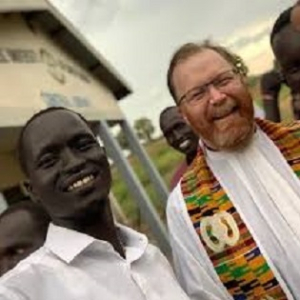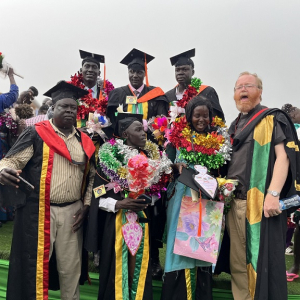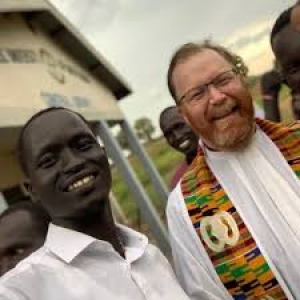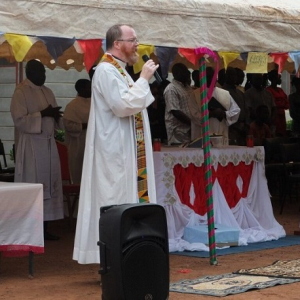Displaying items by tag: Alan Neville MSC
2024 MSC Mission Alive in South Sudan, acknowledging MSC and OLSH missionaries
2024 MSC Mission Alive in South Sudan, acknowledging MSC and OLSH missionaries
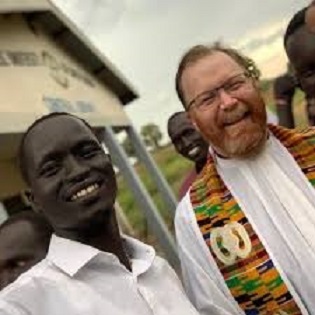
Continuing the work of Alan Neville MSC, Irish Province, in South Sudan
A New AcademicYear
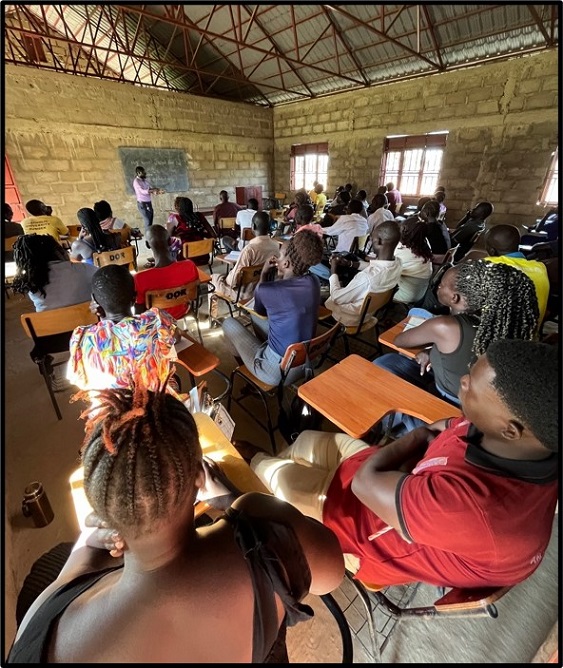
It’s all go as usual in the Catholic University of South Sudan, Rumbek Campus. As we are approaching the end of one year, we are already in full swing getting organised for the next. The University is small, but growing and we are committed to seeing it flourish. Earlier this month, we launched a promotion programme for our new intake. We arranged a series of Facebook ads, printed flyers, put posters up around town, made Church announcements, and hosted two radio talk shows with our students.
Without a doubt our students are our best adverts and promotors. Many of our new applicants have come through their personal recommendation. Their collaboration is essential and invaluable. However, we are faced with two significant challenges right now. The first is that the basic educational attainment level remains low.
There is still a great deal of investment needed in primary and secondary education. According to the UN, South Sudan has the lowest expected school attendance in the world at just 5.6 years on average.
This is why the work ofthe University in training professional, qualified teachers is so imperative.In addition, there has been significant inflation since the beginning of the year, reaching 320% since January. This means that finding money for University fees is especially difficult. To this end we have worked to make them as low as possible and continue to offer a partial scholarship to women. For many, it is still not enough.
Fostering Bodyand Mind
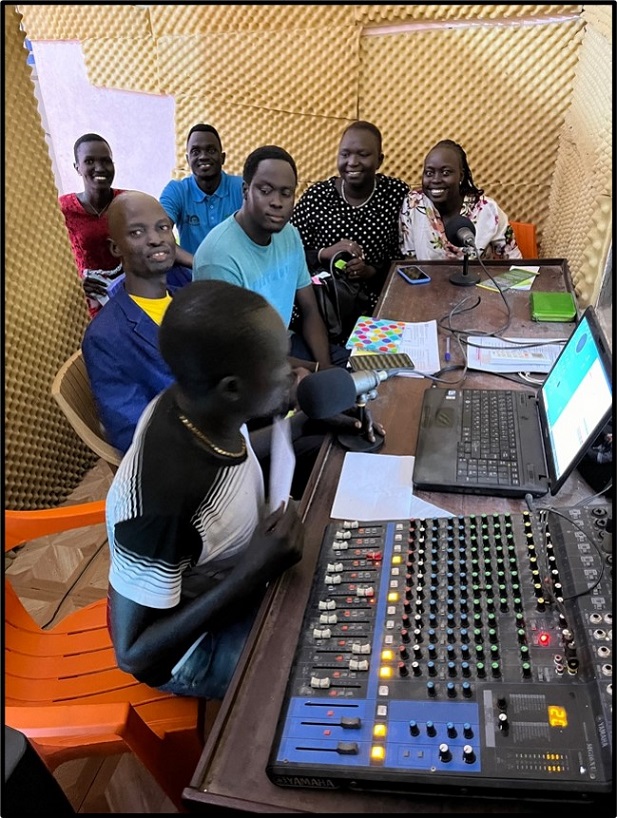
It is not enough to just educate our students, we also need to attend to their complete wellbeing.
Here that means addressing issues like Hepatitis B. Seventy percent of all new global infections of viral hepatitis B and C occur in sub-Saharan Africa due to insufficient interventions and the rate in SouthSudan is a real problem. Hepatitis mortality remains high due to low treatment coverage.
To this end, we have been working with the Mary Ward Primary Health Care Centre to test and vaccinate all of our students and staff who wish to take part. Those who are found to be Hep. B carriers are referred onwards for further treatment. Three out of four students and staff have already received their first dose, with second due later this month, and the third in September.
Get that Job!
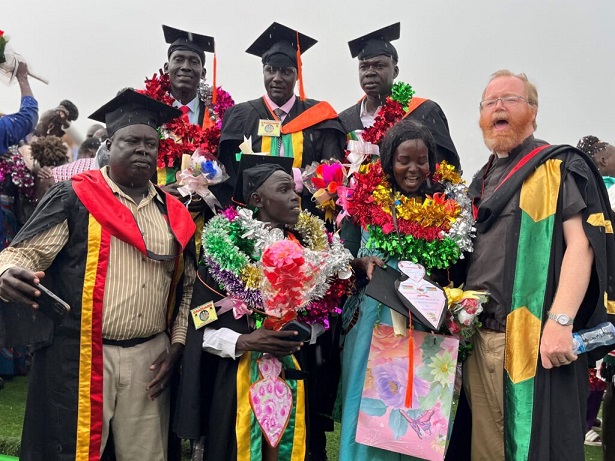
As mentioned already, the South Sudanese economy is struggling and opportunities for employment are few and far between. Any time there is a job posting the response is immediate and overwhelming, with many not even been shortlisted,let alone interviewed!
To support our students we arranged a workshop on interview technique with a member of Caritas, one of the largest organisations working in South Sudan. He worked with them on the essentials of best practice, good preparation, effective communication, and strong presentation. The attendance by students was enthusiastic, with standing room only for latecomers. If given half the chance they have the drive and creativity to really shape and change the economy and their community for the better. Such sustainable economic development by South Sudanese themselves is at the heart of our vision for the University.
Full House
This week our end of year exams began and will continue until the end of the month. Around the campus student study groups are running as they prepare for tests in managerial accounting, African literature, computer literacy, entrepreneurship and innovation, economics, and ethics. All our first and second years sat my Church history exam yesterday and the stack of their uncorrected scripts are staring at me balefully from across the office. It’s perhaps the only aspect of lecturing I do not enjoy … to put it mildly!
While the exams continue, we are also welcoming our new first year students.
They will begin their bridging course tomorrow, which is comprised of eight weeks of intensive maths and English to help them as they start their third level studies. All going well they will be ready to begin their first courses by the middle of October.
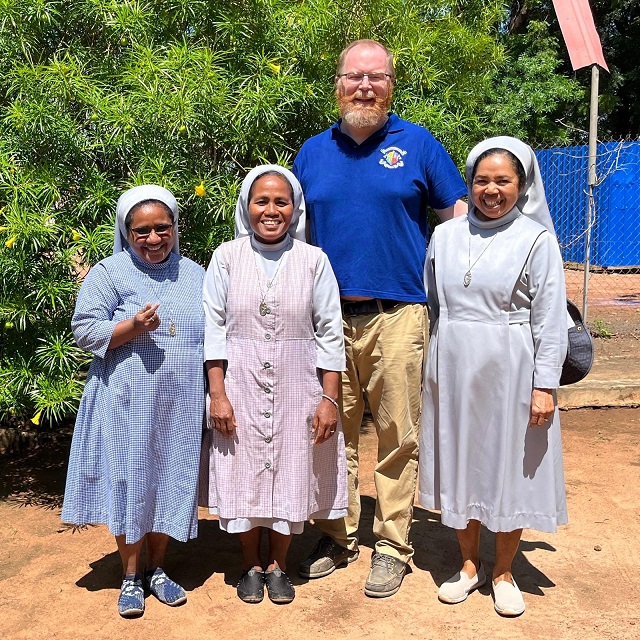
Nhialic ke yin(God bless you as they say here),
Fr. Alan Neville msc
Director
CUSS Rumbek
MSC South Sudan news: Alan Neville MSC, Endings and Beginnings.
MSC South Sudan news: Alan Neville MSC, Endings and Beginnings
Sent by the MSC Mission Office Australia. Alan Neville is from the Irish Province. There is war and famine in neighbouring Sudan. South Sudan is a new country -but MSC and OLSH presence, including OLSH Sisters from Australia, has continued for many years.
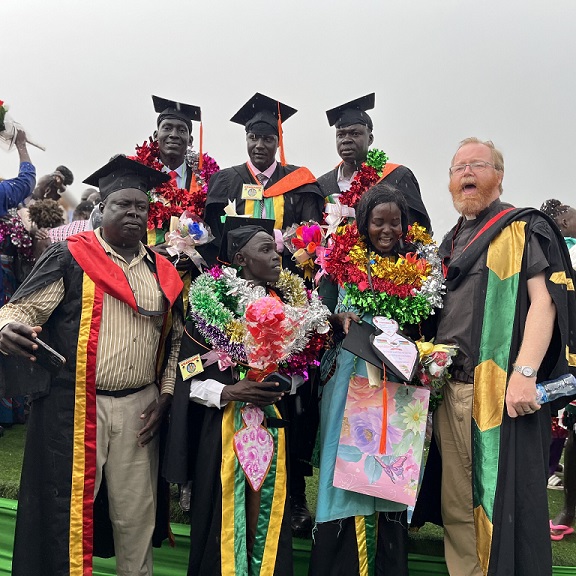
It has been a busy few months in the Catholic University of South Sudan, Rumbek and, as always, life is filled with activity. The economic crisis has deepened, due to the war in Sudan and runaway inflation here. Teachers, nurses, policemen, and civil servants have now not been paid since last October. How people manage to survive at all is one of the enduring mysteries. However, the South Sudanese are a courageous and resilient people and life has to go on.
Joyful Graduations
We are a new Catholic third level institution, so this year marked the graduations of our first class.
Our four Diploma in Business Administration and two Diploma in Accounting and Finance students joined us in our mother campus of Catholic University in Juba. In addition to our Diploma class, thirteen more Bachelor of Business Administration and Bachelor of Education students will graduate later this year.
For many ofthem, they will be the first member of their family to have earned a third level qualification. It is a source of tremendous excitement for all involved.
More importantly, after decades of deliberate under investment in the south before independence by the Sudanese government, these men and women are among the first groups of South Sudanese men and women to be graduate as local teachers and business people.
Our Bishop, Christian Carlassare, was the guest of honour on the day, and spoke with pride about the difference the graduates would make in creating a stronger,most sustainable future for South Sudan.
We have also established a group for these new alumni, so that they can continue to avail of the resources of the University as they begin their careers. Access to the internet here is among some of the most expensive globally due to our isolated location.
However, with the support of the MSC Mission Office Australia all of our computers are online, allowing them to search for employment, carry out research, and prepare CVs and applications.
For our current students, it has opened up an entirely new dimension, giving them access to textbooks, videos and online software that previously they could only have wished for.
CreativeCollaboration
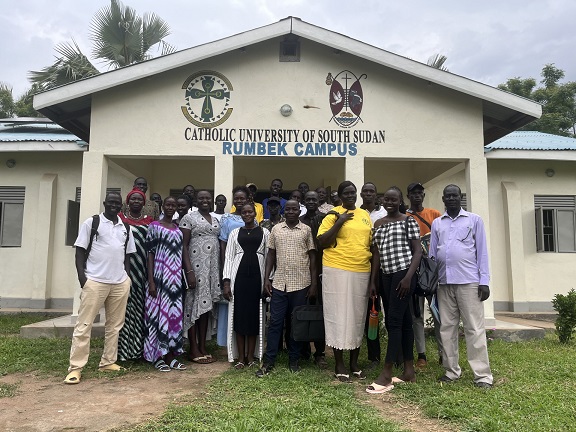
Resources here are few and we are always looking for innovative ways to support the professional development of our students. To this end we are collaborating closely with the Department of Human Sciences in the University of Salerno.Every three weeks, our Bachelor of Education students have a special input delivered online by a senior member of the faculty. They focus on some of the latest techniques and methodologies that will help develop their teaching practice.To date we have studied cognitive difficulties in youth, the design of classrooms to facilitate greater participation, and Universal Design for Learning.
All of our students speak English as a second, sometimes third language and the demands of academia can present a significant challenge. To tackle this issue we currently offer advanced English classes for our first and second years.
In an exciting new partnership with the Loreto Education Centre, we are also setting up small group classes for students who need extra support, along with classes in English for business professionals.
New Beginnings
While these last months have been a time of saying goodbye to some, we are getting ready to welcome others. Earlier this week we launched our admissions programme for new students. While our Bachelor of Business Administration remains popular, the two Bachelor of Education degrees are our main focus.
The development of well-trained local secondary school teachers is our central goal and we see it as an essential component in the continued development of South Sudan.
As part our admissions drive we will have students involved in talk shows on two different local radio stations, use social media advertising, put up posters around town, make announcements after Masses, distribute flyers, and most importantly encouraging our students to spread the news by word of mouth.
As ambassadors for the University, their recommendation is the most effective way of engaging new students and they have been enthusiastic in their mission.
As always we endeavour to encourage as many women as possible to study with the help of our partial scholarship programme and along with our measures to facilitate mothers with young children. We are also one of the few institutions nationally that have a wheelchair toilet and a fully accessible campus. Here, education is for everyone.
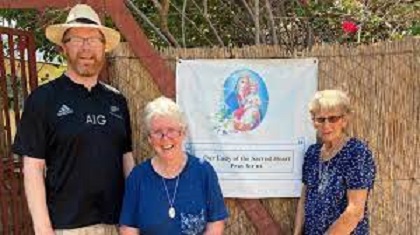
Memories of OLSH and MSC in Sudan
MSC International, South Sudan, a story from Alan Neville MSC, Ireland
MSC International, South Sudan, a story from Alan Neville MSC, Ireland

Malaria
On Sunday evening I was getting ready for the week ahead, planning for the work in the University and the schools, when I began to feel unbearably cold. A quick check with one of our nurse practitioners confirmed my suspicions. I had my first bout of malaria. If you haven’t had it, it’s difficult to accurately describe. Your fever alternates between being roasting hot and then freezing cold. It’s bizarre to ever think you will end up shaking with the cold, in bed with two blankets, when the room temperature is well into the 30C, but there I was. Thankfully the Sisters moved me into the Convent to keep an eye on me. Hardly necessary in my opinion, as all the world knows how easy Irish men are as patients. You’d hardly think we were sick at all! I was thankful for their care by the time I finished.
Anyway, aside from fever, there are headaches, body aches, nausea, and lots of other things that are perhaps not fit to print. The vivid dreams were something of a shock. In one in particular I found myself at a Eucharistic Congress in a large stadium, when a runaway train barrelled through the proceedings. I hopped on for fun, managed to avoid hitting three trams, before eventually crashing the train just outside a Spar in Ireland. The manager came out to thank me, took my photo, gave me flowers and chocolate, and then charged me for both of them, which I thought was a bit much.
Now, rambling, nonsensical vivid dream aside, the harsh reality is that malaria is easily one of the main causes of child death in our area. It always bothered me that at the end of the first year pandemic we had six or seven viable vaccines available. Malaria kills over 600,000 people a year, but still we are waiting on a vaccine. Simply put, rich people don’t get malaria, so there is not impetus to find a cure in the same way we came together to tackle Covid. The part of malaria that is most responsible for deaths is the fever. Young children often don’t have the strength to deal with the high temperatures, but all that is needed to reduce their temperature is a simple paracetamol.
It took five days for me to get over my first experience of malaria. I was lucky to have a clinic nearby, access to medication, and a caring community. Not everyone is. That is why the work of not just the school, but the clinic here is indispensable. Life has its highs and lows, and as we give thanks for one, we must remind ourselves to work to help those in the other. That is what Christ demands of us. Nothing less will do.
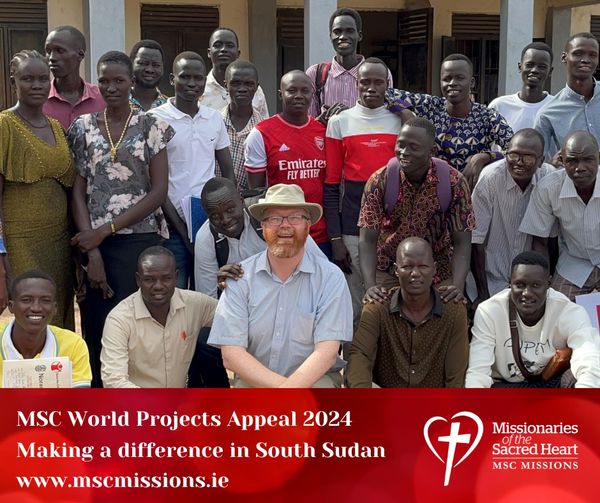
MSC International, South Sudan, a story from Alan Neville MSC, Ireland
MSC International, South Sudan, a story from Alan Neville MSC, Ireland

Whistling Tunelessly
What is the meaning of happiness? Philosophers have speculated on the topic since the beginning of the human story. The answers provided to date are varied and many, but few would include driving along a dirt road, at night, in the rain, perched precariously on a half a driver’s seat (the rest has somehow mysteriously disappeared over time) in a pick-up truck that your average NCT technician would not only refuse to examine due to concerns for their personal safety, but would happy fire bomb with a Molotov cocktail from the comfort of their office. Yet, this is where I found myself a week ago on a Thursday night, whistling somewhat tunelessly as I drove alone. Happiness. It comes in the most surprising of places.

The destination for my rather battered pickup filled with tables was our clinic, which the following day, would the site of the Loreto Graduation. Over fifty young women marked the end of their formal studies with us and are now looking forward to their Senior Four national exams in just over a week. The day is not just a graduation though. It means much more, as it is a visible sign of how far these young women have come in the face of many challenges. The number of women successfully completing secondary school in South Sudan remains one of the lowest in the world according to the UN.

So, for these young women and their family who attended, it really is something to celebrate. It symbolises a continued new chapter in the history of the country, where slowly (in reality too slowly) women are making their own way in the world. The early mornings and late nights of study, along with their daily classes, have paid off. For their graduation their families all gathered to give thanks to God for what has been achieved in a Mass with Bishop Christian. After that, it was all singing, dancing, and sharing food with one another, but overall it was pure joy. Even the hardest of heart could not help to be happy there.

Sister Orla at the Graduatiion
